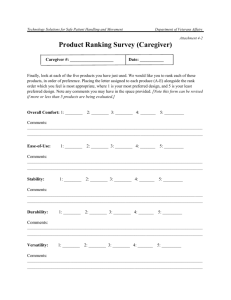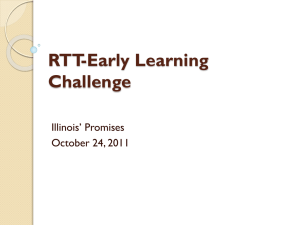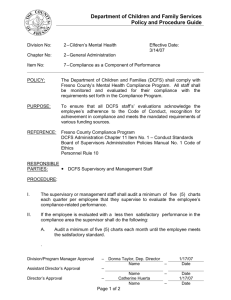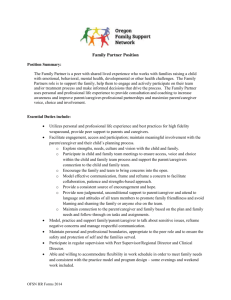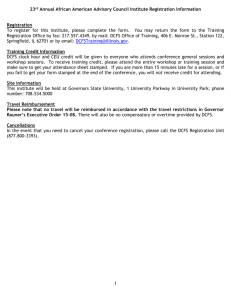management directive - Los Angeles County Department of Children
advertisement
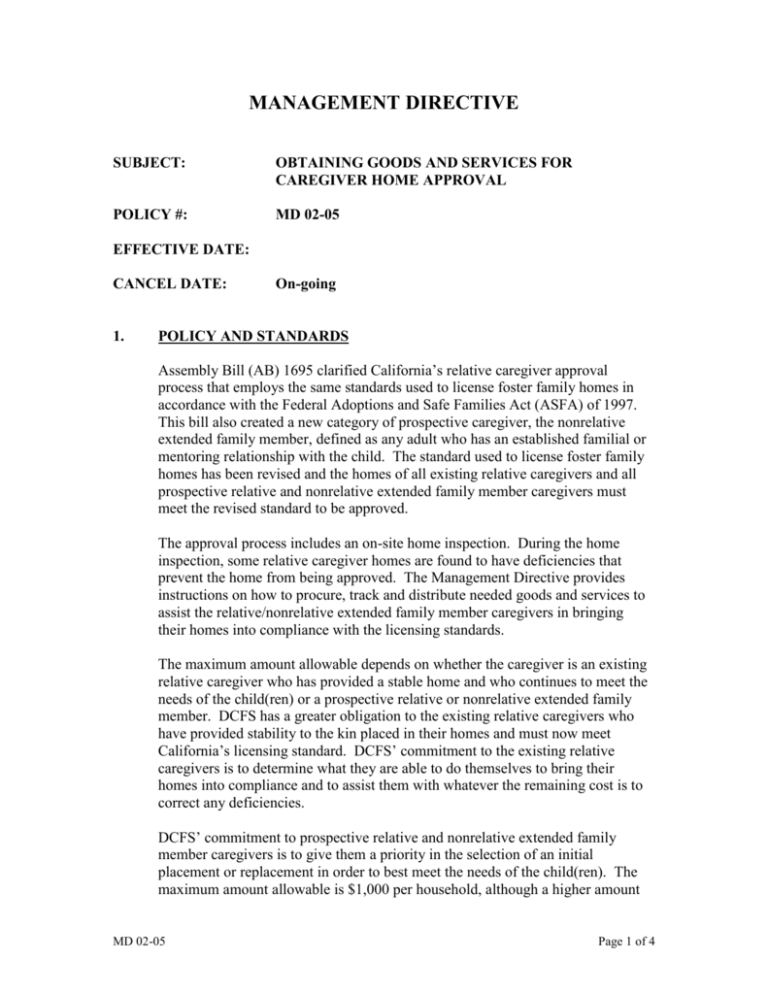
MANAGEMENT DIRECTIVE SUBJECT: OBTAINING GOODS AND SERVICES FOR CAREGIVER HOME APPROVAL POLICY #: MD 02-05 EFFECTIVE DATE: CANCEL DATE: 1. On-going POLICY AND STANDARDS Assembly Bill (AB) 1695 clarified California’s relative caregiver approval process that employs the same standards used to license foster family homes in accordance with the Federal Adoptions and Safe Families Act (ASFA) of 1997. This bill also created a new category of prospective caregiver, the nonrelative extended family member, defined as any adult who has an established familial or mentoring relationship with the child. The standard used to license foster family homes has been revised and the homes of all existing relative caregivers and all prospective relative and nonrelative extended family member caregivers must meet the revised standard to be approved. The approval process includes an on-site home inspection. During the home inspection, some relative caregiver homes are found to have deficiencies that prevent the home from being approved. The Management Directive provides instructions on how to procure, track and distribute needed goods and services to assist the relative/nonrelative extended family member caregivers in bringing their homes into compliance with the licensing standards. The maximum amount allowable depends on whether the caregiver is an existing relative caregiver who has provided a stable home and who continues to meet the needs of the child(ren) or a prospective relative or nonrelative extended family member. DCFS has a greater obligation to the existing relative caregivers who have provided stability to the kin placed in their homes and must now meet California’s licensing standard. DCFS’ commitment to the existing relative caregivers is to determine what they are able to do themselves to bring their homes into compliance and to assist them with whatever the remaining cost is to correct any deficiencies. DCFS’ commitment to prospective relative and nonrelative extended family member caregivers is to give them a priority in the selection of an initial placement or replacement in order to best meet the needs of the child(ren). The maximum amount allowable is $1,000 per household, although a higher amount MD 02-05 Page 1 of 4 can be approved by the RA or ASFA Program Manager. The CSW shall evaluate the likelihood of the prospective relative or non-relative extended family member caregiver being able to comply with the Case Plan and concurrent planning. However, since these placements, unlike the existing relative caregivers, have no history of success with the child(ren), DCFS needs to justify the expense of developing these homes. As part of the justification, the CSW shall consider, at a minimum, the expected length of the placement; keeping a sibling group together; how extensive the deficiencies are; and, if age appropriate, the wishes of the child(ren). Expenses that involve the improvement of a rental property must be approved by the RA or ASFA Program Manager and cannot exceed $500. Expenses to cover first and last months rent are only allowable for existing relative caregivers; any exceptions must be approved by the RA or ASFA Program Manager. The CSW and caregiver are not responsible for procurement. Procurement is the responsibility of the Department using county-approved procurement methods. All goods and services are provided on a one time only basis. Reoccurring needs or future needs must be met by the caregiver or consideration be given to removing/replacing the child. The only exception is a future need to secure goods to approve the home for a subsequent child to be placed with his or her relative or nonrelative extended family member caregiver. To meet the needs of the caregivers for goods and services, the Department intends to use Federal and State allocated funding and donated goods and services. DCFS’ Finance Section shall Claim all related expenditures to the state and account for all allocated funding and cash donations.. DCFS’ Procurement Section will purchase all requested goods and services from appropriate vendors and track and distribute all donated goods and services. Donated cash, goods and services will always be used prior to using allocated funding. Donated goods, services and cash are procured by Departmental fundraising activities. No donations can be accepted from any donor who is in the process of contracting with Los Angeles County. The following guidelines must be followed when accepting donations: Goods: Only gift certificates specifically designated by the donor regarding what item can be purchased Donor can store items until need or for at least 90 days Donor must be willing to deliver for no fee the items to the caregiver Only new items can be accepted MD 02-05 Page 2 of 4 Services: Donor must be a bonded company Donor must be willing to provide a minimum of 25 units of services Cash: Donor must indicate on the check that the money is for relative caregivers DCFS has developed an ASFA Resource Team comprised of Fundraising and Resource Development, Procurement, Finance and Regional Office Designees (i.e., selected by the Regional Administrators). The ASFA Resource Team will work with the Commission for Children and Families, the YOU Board, the Children’s Trust Fund, and corporate partners to develop donor partnerships. 2. PROCEDURES A. WHO Procurement WHEN: A CAREGIVER NEEDS GOODS AND/OR SERVICES TO MEET THE APPROVAL STANDARD HOW 1. Receive and clock-in the DCFS 800-A, Caregiver Approval: Request for Goods and Services. 2. Acknowledge via fax or e-mail to the regional Office Designee receipt of the DCFS 800-A. 3. Process the DCFS 800-A within seven business days of receipt. Ensure that vendor selection and all purchasing procedures are in compliance with Internal Services Department Purchasing Standards. Fill items requested using the following priority of availability: a. Donated goods and services b. Previously purchased goods c. Allocated public funding 4. Generate a Purchase Order (PO) and forward a copy to the vendor, Finance and the regional Office Designee. MD 02-05 Page 3 of 4 WHO HOW Procurement NOTE: Vendor sends an invoice to: DCFS Finance Division 425 Shatto Place, Room 204 Los Angeles, CA 90020 5. Fax the Purchase Order (PO) receipt from the vendor to the Office Designee (whose name and office fax number are on the DCFS 800-A). 6. Maintain a file of DCFS 800-As and purchasing documents for audit purposes. Retain for five years. Finance 1. Receive PO from Procurement. 2. Receive an invoice from the vendor. 3. Receive the DCFS 800-A from the Regional Office Designee with Section B., “Delivery Verified” dated. 4. Issue payment. 3. FORMS DCFS 800-A, Caregiver Approval: Request for Goods and Services MD 02-05 Page 4 of 4
